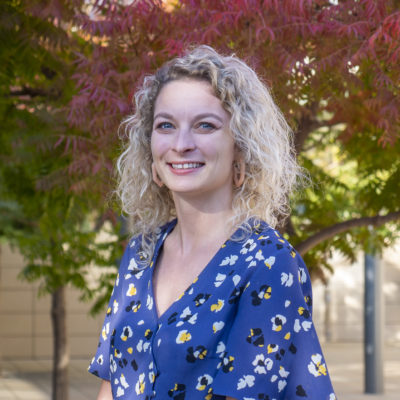Hometown: Lawrence, Kansas
Education: University of Southern California
Affiliations: Managing Editor, California Law Review Vol. 109
I wanted to be a journalist ever since I was in middle school. I majored in journalism in undergrad, I did summer internships at different newspapers, and ultimately was hired by the Los Angeles Times after graduating, covering breaking news and crime. I loved the adrenaline rush that came with being a journalist. I thought I would do that for the rest of my life.
I was part of the team of L.A. Times reporters that received a Pulitzer Prize for Breaking News for our coverage of the mass shooting in San Bernardino. Unfortunately, by that point, I had covered a few mass shootings already.
When something like that happens, people want to know how and why. Oftentimes, there are no answers to that question and as a journalist that’s really frustrating. You’re trying to get as much information as possible from witnesses and survivors and law enforcement, always trying to be respectful of the immense amount of trauma that people have just endured. You’re talking to neighbors and family trying to honor the people who died by telling their stories and describing who they were as people just so that readers really understand the magnitude of the loss.
It was a tremendous honor to win a Pulitzer Prize. I didn’t think that was something that I would ever be a part of. But I also think, for myself and my colleagues, as great of an honor as it was, we were very mindful of what exactly we had received that for, and particularly the people who lost their lives that day.
That was the beginning of when I started thinking about what I could do beyond reporting to try to help address some of these issues that are everywhere. But it was really the everyday stories, seeing how policing and the criminal legal system were deeply flawed. I got frustrated after a while. I felt like I was writing about the same problems over and over and hoping that someone would read my articles and do something about it. I decided I wanted to play a more hands on role in solving some of these issues that I was writing about.
Law school was a career change for me, and the more I went through my application process, the more self doubt began to trickle in. But when I came to Admitted Students Weekend, everyone at Berkeley Law seemed so smart and so friendly, and the campus was beautiful. And then during my tour of the law building, we stopped in the California Law Review office, and it felt like a newsroom. And that was the moment where I was like, “Okay, law school is going to be tough. It’s going to be a big adjustment. But this feels familiar, I know I’ll be okay here.”
Joining CLR was just a natural fit for me. I’m incredibly proud of the work that we’ve done at the law review. We’re really committed to uplifting new ideas and new voices that have been historically overlooked and publishing work that is clear and compelling and accessible beyond just the legal community. It’s also been a really great way to get to know my classmates on a personal level. CLR has 160 members, so it’s a really unique opportunity to get to know folks at the law school that you might not otherwise get to know.
I think having a journalism background, particularly in the area of criminal justice, has helped me in law school. When I was a journalist, I talked to people who were most affected by the legal system. Their stories have motivated me and reminded me why I’m here. Plus, effective lawyering can often involve effective storytelling. As lawyers, you’re trying to convince a judge that he or she should rule in your favor; or trying to convince a lawmaker that they need to pass this kind of law to help change someone’s life. If you can tell that story in a clear and compelling way, it’s going to help your case and your clients.
What I really like about law school is that now I get to take on an advocacy role. I’m not just sitting at the table, hearing what other people have to say about these issues or ideas, and writing it down for a story. I get to say what I think about those issues now and bring my ideas to the table. That’s very rewarding.
